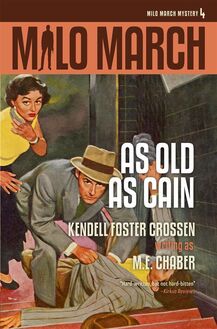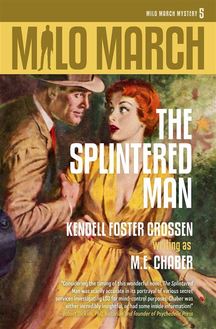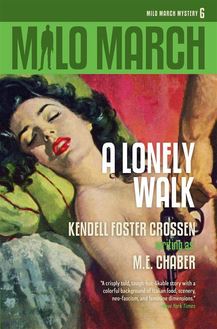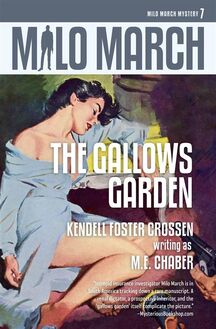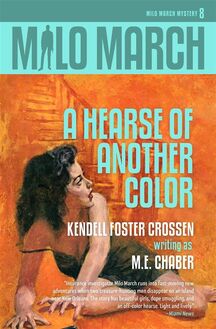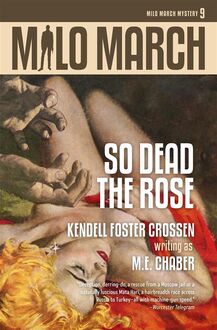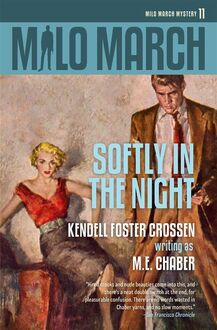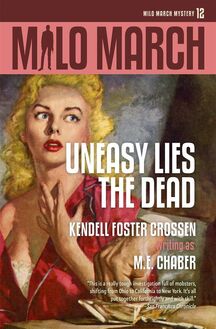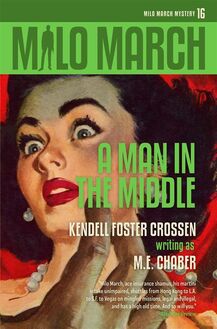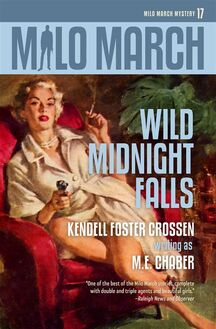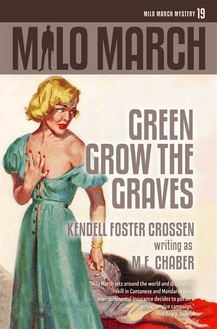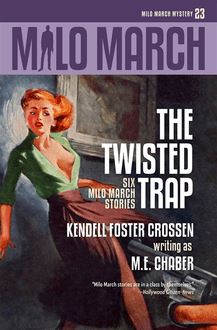-
 Univers
Univers
-
 Ebooks
Ebooks
-
 Livres audio
Livres audio
-
 Presse
Presse
-
 Podcasts
Podcasts
-
 BD
BD
-
 Documents
Documents
-
- Cours
- Révisions
- Ressources pédagogiques
- Sciences de l’éducation
- Manuels scolaires
- Langues
- Travaux de classe
- Annales de BEP
- Etudes supérieures
- Maternelle et primaire
- Fiches de lecture
- Orientation scolaire
- Méthodologie
- Corrigés de devoir
- Annales d’examens et concours
- Annales du bac
- Annales du brevet
- Rapports de stage
La lecture à portée de main
Vous pourrez modifier la taille du texte de cet ouvrage
Découvre YouScribe en t'inscrivant gratuitement
Je m'inscrisDécouvre YouScribe en t'inscrivant gratuitement
Je m'inscrisEn savoir plus
Vous pourrez modifier la taille du texte de cet ouvrage
En savoir plus

Description
The book is distinctive in another way. It is the only Crossen book in which characters from two different series interact. Colonel Kim Locke, featured in three other spy novels by Crossen, lends Milo a miniature-breed military dog for an Intelligence mission. Milo has never worked with a canine before, but man and dog quickly take to each other, and the dog will soon prove himself a valuable friend in a world gone mad.
The American war against the Viet Cong is supposedly over now, and the only U.S. personnel in the South are advisors and attachés. Milo arrives under cover as the new military attaché, assigned to rescue an Intelligence man held captive in the highlands of the North. He decides to present himself to the Communists as an American officer who has come to plead for the release of the prisoner on the humanitarian grounds that he is a civilian and a personal friend who was captured while on an errand of peace. But how to reach Hanoi safely?
An informant sends him to Madame Lê, a beautiful young Chinese Vietnamese woman who is a restaurateur and an officer of the Viet Cong. She is willing to guide Milo on an arduous walk through the jungle. Mindful of the possibility that Madame Lê or her comrades may lure him into the hands of the Viet Cong, to be thrown into the same cell with the American he came to rescue, Milo is taken by surprise when the real danger comes from a completely unexpected quarter.
Milo, who never make plans in advance—except the plan to stay alive one more day—embarks on one of the craziest stunts of his espionage career. And the little dog holds the key.
Sujets
Informations
| Publié par | Steeger Books |
| Date de parution | 10 mai 2021 |
| Nombre de lectures | 0 |
| EAN13 | 9791220802444 |
| Langue | English |
Informations légales : prix de location à la page 0,0012€. Cette information est donnée uniquement à titre indicatif conformément à la législation en vigueur.
Extrait
Death to the Brides
by
Kendell Foster Crossen
Writing as M.E. Chaber
With a Foreword by Richard A. Lupoff
With an Afterword by Kendra Crossen Burroughs
Steeger Books / 2021
Copyright Information
Published by Steeger Books
Visit steegerbooks.com for more books like this.
©2021 by Kendra Crossen Burroughs
First Edition
The unabridged manuscript (1975), has been edited by Kendra Crossen Burroughs and Richard A. Lupoff.
All rights reserved. No part of this book may be reproduced or utilized in any form or by any means, electronic or mechanical, without permission in writing from the publisher. The scanning, uploading, and distribution of this book via the Internet or via any other means without the permission of the publisher is illegal and punishable by law.
Americans see history as a straight line and themselves standing at the cutting edge of it as representatives for all mankind. They believe … that there is nothing they cannot accomplish, that solutions wait somewhere for all problems, like brides.
—from Fire in the Lake: The Vietnamese and the Americans in Vietnam, by Frances FitzGerald
Foreword
1974 and All That
Kendell Foster Crossen was as versatile an author as he was prolific. In addition to hundreds of short stories, he penned some forty-five novels, several comic book series, and many radio and television scripts. He was the author of two series of novels. In the first, the Green Lama, a vigilante crime-fighter based very loosely on the popular Shadow, was featured in fourteen short novels, and would probably have continued for many more had the magazine in which his exploits appeared, Double Detective, not been sold to another publisher who changed its orientation from crime and mystery stories to the sex-and-sadism themes of the so-called “weird mystery” genre.
Crossen’s second major series featured Milo March, a World War II veteran turned insurance investigator and de facto private eye. Milo had served in the OSS (Office of Strategic Services), forerunner of the CIA. After the war he retained his commission as a reserve officer and from time to time was recalled to duty, thereby providing Crossen with reason to insert a spy thriller into what was otherwise a fairly straightforward private eye series.
Twenty-one Milo March novels were published during Crossen’s lifetime. Crossen wrote a twenty-second Milo March novel. In this one, Milo is recalled to the Army, summoned to the White House for a meeting with the President, and dispatched to Vietnam to rescue an important American being held prisoner in Hanoi.
The novel, titled Death to the Brides, was completed in 1975. The years 1974–1975 were tumultuous. Diplomatic teams headed by Henry Kissinger and Le Duc Tho had reached a truce agreement in Paris in 1973. It was an open secret that this was a flimsy device to save face for the Nixon Administration. After what was referred to as “a decent interval,” all concerned expected the flimsy government of South Vietnam would collapse and the country would be reunified with its capital in Hanoi.
In the meanwhile, President Nixon was besieged by critics because of the Watergate scandal. At first, Nixon dismissed the incident as “a second-rate burglary,” but his attempts to cover up the crime drew him deeper and deeper into a morass that eventually cost him the Presidency.
In the midst of this complex tangle, Milo March flies to Vietnam to begin what would be his final series of exploits. But when Crossen’s editor at Holt, Rinehart & Winston read the manuscript, he demanded changes that Crossen was unwilling to make. Chiefly, Nixon appears onstage, not named but clearly indicated. Crossen’s portrait of the President was, to say the least, not flattering. Later in the book, without overtly taking sides, Crossen implies that the North Vietnamese and Viet Cong were not so much Communist aggressors as anti-colonial nationalists.
Author and publisher at loggerheads, the manuscript was returned and never published—until now.
The author’s executor, his daughter Kendra Crossen Burroughs, asked me to apply an editorial brush to the manuscript. As ex-military, it was not difficult for me to work through the manuscript and clarify details of protocol, uniform conventions, and insignia of rank. I also interpolated a few brief lines of dialog to clarify matters in the narrative. As for the politics of the book, it would have been totally inappropriate for me to change Crossen’s expressed ideas. And in fact the passage of four decades has shown that he was far more right than wrong.
As a dedicated fan of Ken Crossen in general and Milo March in particular, I recommend Death to the Brides as a worthy grace note to the Milo March series and to Ken Crossen’s fine career.
Richard A. Lupoff
One
The name is March. Milo March. I have a small office on Madison Avenue in New York City. The upper half of the door is opaque glass. On it is printed: March’s Insurance Service Corp. Another line below it announces that I am president. I am also the corporation, the only stockholder, and the only employee. Normally, if that word can be used in connection with anything I do, I am an insurance investigator. It’s a living.
I unlocked the door and stepped inside. The mailman had been there and the mail was on the floor, where it landed when pushed through the slot in the door. I scooped it up and walked to my desk. I tossed the mail on top of it and hung up my coat. As I sat down, I noticed that one envelope was sticking out from the others. The return address was a box number in Washington, D.C. There was something familiar about it, but I couldn’t think what it was at the moment.
I opened the drawer of the desk which contained a bottle of bourbon and a glass. I put them on top of the desk. Then, feeling prepared for anything, I picked up the letter and opened it.
I was right about it. The box number was one that I remembered, and the clincher was that the envelope was addressed to Major Milo March. I opened the envelope and pulled out the letter. The first word I saw was “Greetings.” I put it down and poured myself a drink. A quick drink gave me enough false courage to read the rest of the letter.
It wasn’t exactly the sort of news that thrilled me. It merely told me that I was being recalled to active duty in the United States Army Reserves.
I must confess: I have another job, but it’s only part time. You might guess it has something to do with the Army. In fact, it has everything to do with the Army. I had spent several years assigned to Army Intelligence or to the CIA, usually in espionage.
They had taught me a number of things which just wouldn’t look right in civilian life, so when my tour of duty was over, they asked me to enlist in the Reserves. Like a damn fool, I did. This was the sixth time I’d been recalled to active duty. The letter told me that there was a reservation on a plane for Washington and ordered me to be on it in full duty uniform. It also included the information that I would be met at the airport in Washington and that I would be paged after the plane unloaded.
I picked up the phone and dialed the number of Intercontinental Insurance, my chief employer. When the girl answered, I asked for Martin Raymond, who was a big wheel at the company. The next voice I heard was that of his secretary.
“Hi, honey,” I said. “This is Milo March. Is the great man in and available?”
“He’s in, but I don’t know about the rest of it. The last I knew he was working on the crossword puzzle. You want to ask him for money?”
“Goodness, no. I may sometimes pound on the desk and demand money, but I never ask for it. It would be beneath my dignity.”
“Well, I’ve never known you to be interested in more than two things. If it’s not money, then it’s girls. But where does our Martin Raymond fit into that picture?”
“He doesn’t,” I said. “Just ring him and tell him I want to talk to him for a moment and that it’s important.”
“All right. I’ll tell him that you don’t want any money, and that will put him in a good humor for the entire day.”
I held the phone and waited. I heard the click as he picked up his phone. “Milo, my boy,” he said. “How are you?”
“Just fine. I only wanted to—”
“Glad to hear it. Tell me, what’s a four-letter word meaning a constant irritation?”
“Boss.”
There was a moment of silence, then he gave what was supposed to be a laugh. It sounded like a whinny. “That’s my boy. Always pushing the big laugh meter.”
“You laughed too soon, Martin. The next line is better. If you have a job for me within the next few weeks, don’t call me.”
“What? Why not?” He sounded as if I were picking his pocket. “You know we have you on a first-call basis. Who offered you a job?”
“It’s not a job. It’s more of a command. You remember the United States Army?”
“But that’s impossible. You’ve been in the Army. Several times. Besides, it was announced that we’ve achieved a new peace—with honor.”
“Martin,” I said gently, “they didn’t say whose honor. They merely ordered me to be there today. The only additional message was that there would be somebody meeting me at the airport.”
“That must be unconstitutional!”
“They sneaked it through one day when you were at the club,” I said wearily. “I’ll call you when I get back.”
“We’ll miss you,” he said, making it sound like a funeral speech. “And I want you to know that we at Intercontinental are proud of you. When it gets rough, you can be sure that we’re back of you all the time.”
“How far back, Martin?”
“What?” He sounded puzzled.
“Remember General Custer? He fought the Cheyenne at Big Horn. The m
-
 Univers
Univers
-
 Ebooks
Ebooks
-
 Livres audio
Livres audio
-
 Presse
Presse
-
 Podcasts
Podcasts
-
 BD
BD
-
 Documents
Documents
-
Jeunesse
-
Littérature
-
Ressources professionnelles
-
Santé et bien-être
-
Savoirs
-
Education
-
Loisirs et hobbies
-
Art, musique et cinéma
-
Actualité et débat de société
-
Jeunesse
-
Littérature
-
Ressources professionnelles
-
Santé et bien-être
-
Savoirs
-
Education
-
Loisirs et hobbies
-
Art, musique et cinéma
-
Actualité et débat de société
-
Actualités
-
Lifestyle
-
Presse jeunesse
-
Presse professionnelle
-
Pratique
-
Presse sportive
-
Presse internationale
-
Culture & Médias
-
Action et Aventures
-
Science-fiction et Fantasy
-
Société
-
Jeunesse
-
Littérature
-
Ressources professionnelles
-
Santé et bien-être
-
Savoirs
-
Education
-
Loisirs et hobbies
-
Art, musique et cinéma
-
Actualité et débat de société
- Cours
- Révisions
- Ressources pédagogiques
- Sciences de l’éducation
- Manuels scolaires
- Langues
- Travaux de classe
- Annales de BEP
- Etudes supérieures
- Maternelle et primaire
- Fiches de lecture
- Orientation scolaire
- Méthodologie
- Corrigés de devoir
- Annales d’examens et concours
- Annales du bac
- Annales du brevet
- Rapports de stage
